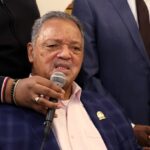
On a day as cruel as the Arctic wastes where Alexei Navalny died, his mother was denied the chance to see the body of the most prominent person speaking out against Russian leader Vladimir Putin.
Navalny was 47 when he died Friday in a Russian penal colony, having been sent there for the crime of speaking out against Putin’s regime.
“Navalny was murdered. His death occurred on February 16 at 2:17 p.m. local time,” Navalny’s representative, Kira Yarmysh, said Saturday, according to CNN.
“We demand that (his) body be handed over to his family immediately.”
Russia has had other ideas, putting his mother, Lyudmila Navalnaya, 69, through roadblock after roadblock on Saturday after she flew to the town of Kharp, 1,200 miles from Moscow, according to ABC.
When she arrived at the prison where her son was held, she was told that Navalny died of “sudden death syndrome,” a different explanation than given Friday, when officials said he didn’t feel well after a walk and fell unconscious, per ABC.
“They waited for two hours, after which a colony employee came out to them and stated that the body of Alexei Navalny was in Salekhard [a nearby town], that investigators from the Investigative Committee of the Russian Federation had taken it now, and that they were now conducting an investigation on it,” Yarmysh said, according to CNN.
Navalnaya arrived in Salekhard, more than an hour from the prison, to find the morgue there closed. A lawyer with her reached someone at the morgue, who said Navalny’s body was not there after all.
In sub-zero temperatures, Navalnaya walked to the city’s Committee office, where she was told no cause of death had been officially determined, according to ABC.
Was Navalny killed?
Yes: 95% (21 Votes)
No: 5% (1 Votes)
Navalnaya was told her son’s body would be held by the regime that imprisoned him until additional examinations were finished.
“Only an hour ago, the lawyers were informed that the investigation had been concluded and that something criminal had not been established. They literally lie every time, driving us around in circles and covering their tracks,” Yarmysh posted on X.
“It’s obvious that they are lying and doing everything they can to avoid handing over the body.”
Navalny had said after he was sentenced to 19 years in prison in 2021 that he was “serving a life sentence, which is measured by the length of my life or the length of life of this regime,” according to ABC.
In an Op-Ed in The Guardian, Odessa Rae, who produced a documentary on Navalny, said his cause must live on.
“He spent the last 15 years of his life working through his foundation in the hope of dethroning Putin from his authoritarian regime. I know he would urge that mission, and his message to Russia would be to not become something of the past but something that is continued in some way – that they do not, in the words of Dylan Thomas, go quietly into the night,” she wrote.
“I hope that this is what his legacy brings. There is more to fight for, to stand up and take action for.”
While in prison, Navalny was allowed to communicate by message with the outside world for an hour each week, according to The Hill, and in a Jan. 17 post on Facebook, he tried to explain why he returned to Russia from Germany when he expected the Putin regime would kill him sooner or later.
“I have my country and my beliefs. And I don’t want to give up neither the country nor the beliefs,” Navalny wrote. “And I can’t betray neither the first nor the second. If your beliefs are worth something, you have to be ready to stand for them. And if necessary, make some sacrifices.”
The message ended with a valediction about a time in Russia he would never live to see.
“She will collapse and crumble. Putin’s state is unviable. One day we will look at his place and he will be gone. Victory is inevitable. But for now, you have to not give up and hold on to your convictions,” he wrote.
_____________________________________________







